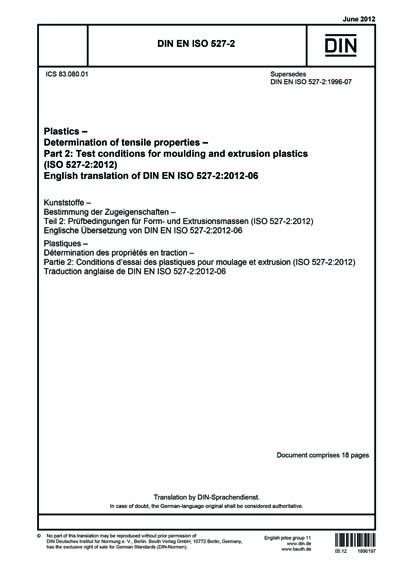Most recent
DIN EN ISO 527-2:2012
Plastics - Determination of tensile properties - Part 2: Test conditions for moulding and extrusion plastics (ISO 527-2:2012); German version EN ISO 527-2:2012
This part of ISO 527 specifies the test conditions for determining the tensile properties of moulding and extrusion plastics, based upon the general principles given in ISO 527.1. The methods are selectively suitable for use with the following range of materials: rigid and semi-rigid thermoplastics moulding, extrusion and cast materials, including compounds filled and reinforced by, for example, short fibres, small rods, plates or granules but excluding textile fibres (see ISO 527-4 and ISO 527-5). See ISO 527-1:2012, Clause 3 for the definition of "rigid" and "semi-rigid". rigid and semi-rigid thermosetting moulding and cast materials, including filled and reinforced compounds but excluding textile fibres as reinforcement (see ISO 527-4 and ISO 527.5); thermotropic liquid crystal polymers. The methods are not normally suitable for use with rigid cellular materials or sandwich structures containing cellular material. For rigid cellular materials see ISO 1926. The methods are not suitable for flexible films and sheets, of thickness smaller than 1 mm, see ISO 527-3. The methods are applied using specimens which may be either moulded to the chosen dimensions or machined, cut or punched from injection. or compression.moulded plates. The multipurpose test specimen is preferred (see ISO 20753).
Deutsches Institut für Normung [din]

